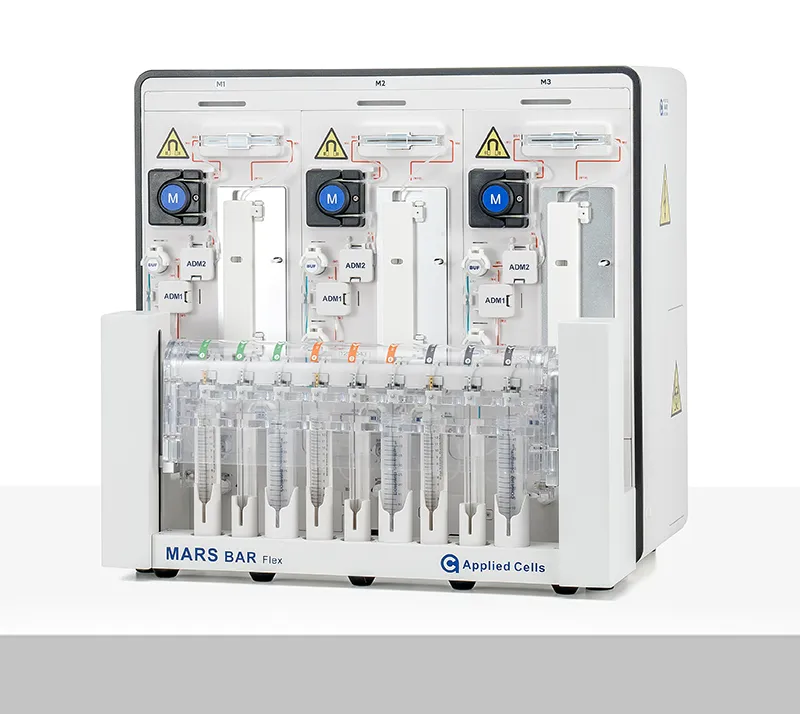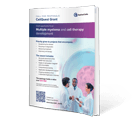Myeloma CellQuest Grant 2023
Accelerating Progress in Multiple Myeloma Clinical Research
Recipients of 2023 Research Grant
-
 Dr Doriana GramegnaIRCCS Istituto Tumori Giovanni Paolo IIDeciphering Myeloma Microenvironment for Personalized Bispecific Antibody Therapy
Dr Doriana GramegnaIRCCS Istituto Tumori Giovanni Paolo IIDeciphering Myeloma Microenvironment for Personalized Bispecific Antibody Therapy -
 Dr Vanessa DesantisUniversity of BariOptimizing the Crosstalk between Immune-microenvironment and Multiple Myeloma
Dr Vanessa DesantisUniversity of BariOptimizing the Crosstalk between Immune-microenvironment and Multiple Myeloma -
 Dr Sabina ŠevčíkováMasaryk UniversityUnraveling Molecular Markers in Multiple Myeloma Relapse
Dr Sabina ŠevčíkováMasaryk UniversityUnraveling Molecular Markers in Multiple Myeloma Relapse
“This project will have the potential to reshape precision medicine in Multiple Myeloma, offering a personalized interpretation of transcriptomic data for prognostic and predictive purposes.”

Dr Doriana Gramegna
IRCCS Istituto Tumori Giovanni Paolo II
Deciphering Myeloma Microenvironment for Personalized Bispecific Antibody Therapy
Doriana Gramegna, MD, is a Hematologist currently appointed as a Physician and Coordinator of the Multiple Myeloma translational research Unit at ‘’Istituto Tumori Giovanni Paolo II” in Bari. Dr. Gramegna earned his MD degree magna cum laude in 2016 at the University of Perugia (Perugia, Italy) and from 2016 to 2020 completed her clinical/research fellowship in Hematology at the University of Pavia (Pavia, Italy). In January 2021, Dr. Gramegna joined the Nikhil C Munshi Lab at the Jerome Lipper Multiple Myeloma Center at the Dana-Farber Cancer Institute and Harvard Medical School (Boston, MA, USA), where she worked until April 2023. During this exciting period, she has grown increasingly interested in several aspects of myeloma onco-biology, with a focus on cancer biology and immunology.
Dr. Gramegna got selected to present her works in several international meetings and was awarded the American Society of Hematology (ASH) Abstract Achievement Award in 2021. Dr. Gramegna`s research interest is to identify molecular signatures related to multiple myeloma (MM) bone marrow microenvironment, in order to build predictive models towards new immunotherapies.
This project will aim to enhance bispecific antibody (bsMAb) therapy for multiple myeloma (MM) by decoding the tumor microenvironment (TME). Addressing treatment challenges in MM, the study will focus on the bone marrow’s immune and stromal components, including mapping TME components in relapsed/refractory MM patients receiving bsMAb and identifying immune/stromal patterns linked to positive outcomes. The innovative methodology will integrate bulk transcriptomic data analysis and in vitro validation via the MARS platform to isolate prognostic cell types.
Anticipated results, beyond optimizing bsMAb therapy, may unveil new molecular targets and inform future therapeutic strategies, presenting high translational value and promising advancements for MM patient prognosis and treatment.
“The anticipated findings are expected to reshape therapeutic strategies, offering new insights into Multiple Myeloma niche dynamics and providing a stage-related prognostic factor for this challenging malignancy.”

Dr Vanessa Desantis
University of Bari
Optimizing the Crosstalk between Immune-microenvironment and Multiple Myeloma
Dr. Vanessa Desantis, PhDin Biomolecular, Medical and Pharmaceutical Sciences, is currently Assistant Professor (tenured as RTD-B) of Pharmacology at the Department of Precision and Regenerative Medicine and Ionian Area, Bari University Medical School.
During the last 10 years, her translational research has been focused on pre-clinical studies aiming at: i) characterization of action mechanisms for novel drugs and screening of original natural/synthetic active molecules; ii) identification of new molecular targets and potential biomarkers for the efficacy/safety evaluation of treatments in patients with cardiovascular and/or onco-hematological or immunological pathologies; iii) recognition of signaling pathways involved in drug resistance to anticancer agents and antibiotics.
She has developed strong skills in cutting-edge technologies, ranging from cell biology (cellular cultures of both primary and established cell lines, whole-blood and bone marrow cell isolation, protein extraction and Western blotting, immunoprecipitation, transfection assays, pharmacological treatments) to immunological assays (FISH, ISH, ELISA, immunohistochemistry, immunofluorescence), functional assays (cell proliferation, apoptosis, adhesion, spreading, chemotaxis, Matrigel, angiogenesis), nucleic acid purification and handling (DNA extraction, RNA and miRNAs extraction, RT-PCR, gene silencing -siRNA- and miRNAs transfections) and flow cytometry. She also acquired expertise on in vivo studies for tumors implantation, drug administration, and surgical procedures on mouse models.
Parameters (SCOPUS AUTHOR EVALUATION), author ID: 56652343500; https://orcid.org/0000-0003-1942-2601 (Documents: 39; Citations: 859; h-Index: 16).
The project will explore the intricate relationship between the immune microenvironment and multiple myeloma (MM) plasma cells (PCs) to optimize therapies. By focusing on overlooked factors like Fatty Acid Binding Proteins (FABPs), we will aim to validate in silico findings. The research will utilize MM patient samples, particularly high-risk groups identified through cytogenetic markers, with the goal to advance MM diagnostics and therapy. By unraveling the molecular mechanisms behind MM progression and drug resistance, the study will pave the way for patient-specific treatments, aiming to improve outcomes for those facing high-risk MM.
“This knowledge will inform the development of targeted clinical strategies, improving outcomes and enhancing the quality of life for Multiple Myeloma patients.”

Dr Sabina Ševčíková
Masaryk University
Unraveling Molecular Markers in Multiple Myeloma Relapse
Dr. Sevcikova is the head of the Babak myeloma group at the Department of Pathophysiology, Faculty of Medicine, Masaryk University, Brno, Czech Republic. She has been working in the field of multiple myeloma for the past 15 years or so, focusing on the role of non-coding RNA molecules in the pathophysiology of multiple myeloma. She is a member of the International Myeloma Working Group as well as the Czech Myeloma Group. She is a co-author of more than 90 publications and is quite active in providing support for younger researchers as a mentor as well as a supervisor.
Despite therapeutic advancements, including immunomodulatory drugs and monoclonal antibodies, relapse will remain a persistent issue, necessitating a deeper exploration. The project will address the gap in understanding the molecular mechanisms driving MM relapse.
The study will focus on non-coding RNA molecules, particularly microRNAs, and the endoplasmic reticulum (ER) stress response as potential contributors to MM relapse. By investigating how MM cells will adapt or undergo apoptosis in response to ER stress, the project aims to uncover crucial molecular markers associated with relapse within the tumor microenvironment.
About CellQuest Research Grant
CellQuest Grant is a cutting-edge multiple myeloma clinical research opportunity. Multiple myeloma is a complex disorder characterized by abnormal plasma cell growth and bone marrow infiltration. Understanding this challenging disease is crucial for patients and their families, and we recognize the invaluable contribution of MARS® platform users and their innovative research.
The 2023 call aimed to empower researchers to make scientific breakthroughs that have the potential to revolutionize our understanding of multiple myeloma.
Pioneering Research in Multiple Myeloma
CellQuest 2023 grant was targeting scientists across clinical research disciplines, with a special focus on multiple myeloma and cell therapy development. This grant aims to provide instrumental and reagent support, as well as recognition, to outstanding projects demonstrating the potential to drive breakthroughs in these fields.
DECIPHERING THE DISEASE
Exploring the Microenvironment of Bone Marrow in Multiple Myeloma

FOCUSING ON DIAGNOSTICS
Understanding Circulating Tumor Cells in Multiple Myeloma

IMPROVING CELL THERAPY
Improving Protocols for Cell-Based Interventions for Multiple Myeloma

ADVANCING TREATMENT
Tailored Approaches for Multiple Myeloma Therapy

Award
The grant award encompasses:
- six-month placement of the MARS® Bar instrument
- supply of cell isolation reagents* and consumables
- comprehensive training
- application development support
- ongoing assistance from a dedicated Application Scientist
This exceptional package holds a combined value over $30 000.
*Cell separation reagent kits chosen from Applied Cells’ portfolio with a total value not exceeding $8 000.
Application Guidelines
Application submissions for the Myeloma CellQuest Grant 2023 are now closed.
We encourage passionate researchers from around the globe to submit their proposals for a chance to be a part of this exciting opportunity. Take this opportunity to showcase your innovative ideas and contribute to the advancement of scientific knowledge.
To participate in the program, please follow the steps below:
- Complete the application form available on the submission page.
- The application form consists of three main sections:
- Contact and institution information.
- Abstract.
A detailed description of your project (up to 800 words), including its goals, the samples involved, the methods employed, expected results, and the potential impact of your research. - Supplementary data: Include any relevant supplementary files that can provide additional context to your application. This may include figures, a list of citations, or PDFs from previous publications. Each file should be accompanied by a brief description (up to 200 words).
- Please note that only one entry per representative will be considered, and incomplete submissions will not be accepted.
- Submissions should be made exclusively through the online form and must be received no later than November 15th 2023.
- Please contact our Applied Cells Grant Program Manager to schedule a meeting to discuss how our technology works, how it could help you to achieve your clinical research goals, our reagents portfolio, or anything else you may need to prepare your application. We are looking forward to supporting you with your grant application.
Application submissions for the Myeloma CellQuest Grant 2023 are now closed.
One grant recipient will be selected based on the judging process outlined, and the results will be communicated by email from Applied Cells around mid December 2023. The grant recipient is required to accept their award within six months from the date of the award notification.
Eligibility Criteria
The CellQuest grant program is open to researchers in the clinical space, with priority given to projects aligned with the recommended research areas.
- DECIPHERING THE DISEASE: Exploring the Microenvironment of Bone Marrow in Multiple Myeloma
- FOCUSING ON DIAGNOSTICS: Understanding Circulating Tumor Cells in Multiple Myeloma
- ADVANCING TREATMENT: Tailored Approaches for Multiple Myeloma Therapy
- IMPROVING CELL THERAPY: improving protocols for cell-based interventions for multiple myeloma
CellQuest Grant Program Guidelines are:
- Applications must be submitted in English language, with one entry allowed per person.
- Eligible projects should involve human sample types suitable for processing on the MARS® platform, including peripheral blood and blood products, bone marrow aspirates, cultured cells, tissue, and fresh-frozen solid tumors.
- Employees and immediate family members of Applied Cells are ineligible to participate in the program.
- This is an international program, open to researchers of all ages (minors excepted), genders, nationalities, backgrounds, and religions.
- Incomplete or non-compliant submissions will be rejected.
- The program is subject to applicable laws and regulations.
- Participants are responsible for confirming that their participation is permitted by their respective university or organization.
Terms and Conditions
Please read the following terms carefully. By submitting an application, you agree to these terms for yourself and on behalf of your Institution/Company. “You” and “your” shall refer to you personally or your Institution/Company, whichever is applicable. If you do not agree to these terms, then please do not apply to this grant program.


